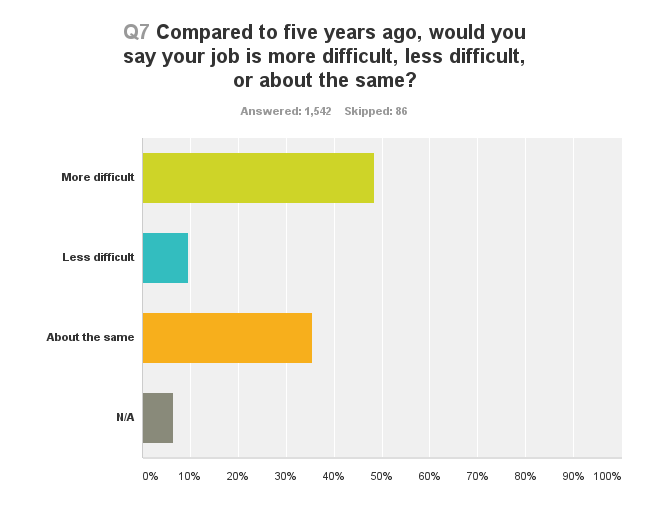“I just cram for the exam and then forget everything.”
Read more ›CURRENT ARTICLE • July 21
OTHER RECENT ARTICLES
 One of the activities I most struggle with as an instructor of visual communications is getting students to give thoughtful and detailed critiques of their fellow students’ work. The critique process for students is challenging for several reasons.
One of the activities I most struggle with as an instructor of visual communications is getting students to give thoughtful and detailed critiques of their fellow students’ work. The critique process for students is challenging for several reasons.
Nearly 75 Percent of Faculty Incorporated Technology into their Teaching in the Past Year
When it comes to technology in the classroom, phrases like “faculty resistance” and the importance of getting “faculty buy-in” are tossed around with great frequency. But is that perception still valid? Are all instructors so set in their ways, skeptical of anything new, and fearful of deviating from what they’ve done that it’s nearly impossible to get them to try something new?
Read More › How often do you hear the following sentiments from students?
How often do you hear the following sentiments from students?
Often the articles highlighted in The Teaching Professor newsletter are examples of pedagogical scholarship that could beneficially be done in many fields. That is the case with this piece on developing writing assignments, but it also contains content useful to any faculty member who uses writing assignments as a major method of assessing student learning in a course.
Read More ›Those who teach in the health disciplines expect their students to retain and apply every iota of learned material. However, many students come to us having achieved academic success by memorizing the content, regurgitating that information onto an exam, and promptly forgetting a good portion of it. In health, as well as other disciplines where new material builds upon the material from the previous semesters, it is critical for students to retain what they learn throughout their coursework and as they begin their careers as a nurse, engineer, elementary teacher, etc.
Read More ›It’s hard to pick up a publication these days without reading something about blended course design or the flipped classroom. Even mainstream media have begun to cover these new approaches to teaching and learning that put more emphasis on active learning.
Read More ›I have a confession to make. I was wrong. You see, I once thought that teaching was lecturing, and I thought that because that is how my graduate mentors taught me to teach.
Read More › “In our class: 1) everyone is allowed to feel they can work and learn in a safe and caring environment; 2) everyone learns about, understands, appreciates, and respects varied races, classes, genders, physical and mental abilities, and sexualities; 3) everyone matters; 4) all individuals are to be respected and treated with dignity and civility; and 5) everyone shares the responsibility for making our class, and the Academy, a positive and better place to live, work, and learn.”
“In our class: 1) everyone is allowed to feel they can work and learn in a safe and caring environment; 2) everyone learns about, understands, appreciates, and respects varied races, classes, genders, physical and mental abilities, and sexualities; 3) everyone matters; 4) all individuals are to be respected and treated with dignity and civility; and 5) everyone shares the responsibility for making our class, and the Academy, a positive and better place to live, work, and learn.”
Improve Accessibility in Tomorrow’s Online Courses by Leveraging Yesterday’s Techniques
Traditionally, when a face-to-face student requested a sign language interpreter or other assistance, individualized accommodation arrangements were made through institutional channels.
Read More ›





